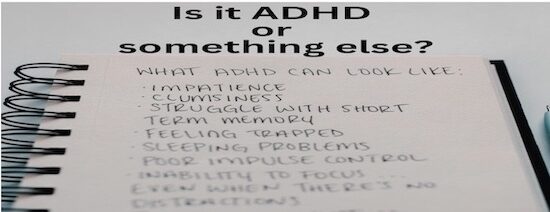
Written by Jennifer Cox LCPC
I wanted to end my series of ADHD blogs with a very important conversation starter.
How many of you have heard these statements?
“I don’t believe in ADHD”
“Everyone has ADHD”
“I am forgetful too”
“I can’t focus”
There will be times when you can’t focus or you forget where you put your keys, but that doesn’t mean you have ADHD. There is criteria that needs to be met and there is criteria that isn’t even in the diagnostic manual that counselors may take into consideration such as emotional regulation, humor, or poor coordination.
Over the past couple months, I have blogged about all of the executive functions and how each of them impact someone daily with ADHD. Now, someone might present with ADHD due to the fact that they are struggling with their executive functions. However, there could be something else behind the scenes as to why their executive functions are being impacted such as lack of sleep, nutrition, anxiety, depression, trauma, electronics addition, instant gratification, etc. However, that would not be an ADHD diagnosis, yes they are struggling, but the focus in therapy or in day to day life should be on different areas, considering the reasoning behind the decrease in their executive functioning – It would be a different diagnosis.
ADHD is a chronic condition, that one will struggle with their whole life. An accurate diagnosis is so important, you wouldn’t want to treat trauma, anxiety, depression, etc as ADHD or vice versa since more harm could be done than good. Just like we don’t want to treat hyperthyroidism as anxiety, even though they can present the same at times, getting the accurate diagnosis is so important and would lead to different treatment. Same goes for this situation, for someone that has their executive functions being impacted due to another diagnosis could see improvements once appropriate treatment is received. For example, with anxiety it is more of a fight or flight, the brain is trying to protect someone and focusing on all the ‘what if’ scenarios which leads to a decrease in executive functioning skills – By decreasing the ‘what if’ thoughts, one could see an increase in executive functioning.
So to answer the blog question – Is it ADHD or something else?
We all have executive functioning skills – Many situations in life will impact them, but that doesn’t mean it’s an ADHD diagnosis. We need to consider the overlapping symptoms, misinterpretations of thoughts, emotions, or behaviors, and lack of ADHD awareness or knowledge (it is so much more than lack of focus or impulsivity). If questioning, it is important to meet with a professional to receive an accurate diagnose and to receive appropriate treatment.
Understanding why your executive functions are impacted and how they impact your day to day, can help one understand why ADHD is a serious disorder – This is a disorder that involves self-control, self-care, self-regulation, and self-motivation to get through your day.
For more information or help with executive functioning, contact 815-363-0864 or info@echcounseling.com

